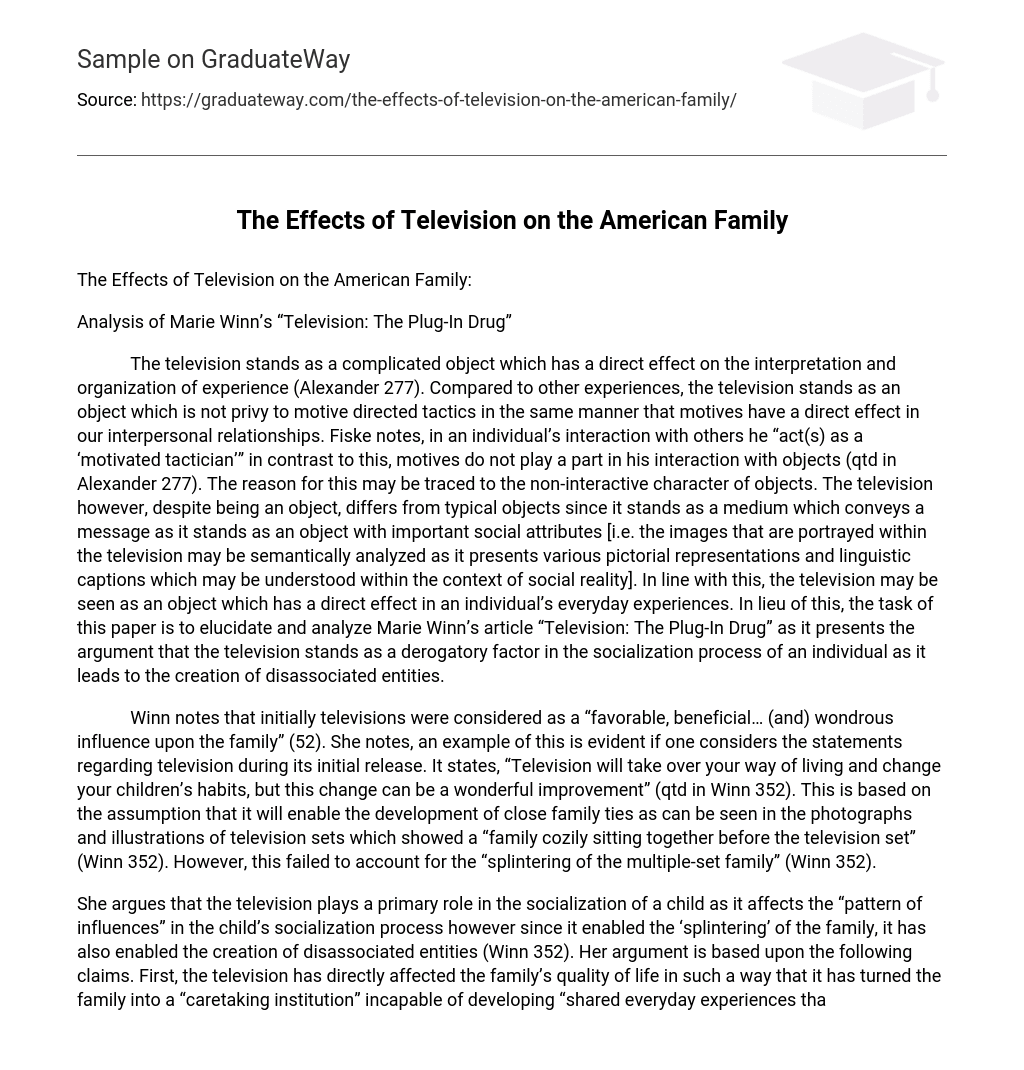The Effects of Television on the American Family:
Analysis of Marie Winn’s “Television: The Plug-In Drug”
The television stands as a complicated object which has a direct effect on the interpretation and organization of experience (Alexander 277). Compared to other experiences, the television stands as an object which is not privy to motive directed tactics in the same manner that motives have a direct effect in our interpersonal relationships. Fiske notes, in an individual’s interaction with others he “act(s) as a ‘motivated tactician’” in contrast to this, motives do not play a part in his interaction with objects (qtd in Alexander 277). The reason for this may be traced to the non-interactive character of objects. The television however, despite being an object, differs from typical objects since it stands as a medium which conveys a message as it stands as an object with important social attributes [i.e. the images that are portrayed within the television may be semantically analyzed as it presents various pictorial representations and linguistic captions which may be understood within the context of social reality]. In line with this, the television may be seen as an object which has a direct effect in an individual’s everyday experiences. In lieu of this, the task of this paper is to elucidate and analyze Marie Winn’s article “Television: The Plug-In Drug” as it presents the argument that the television stands as a derogatory factor in the socialization process of an individual as it leads to the creation of disassociated entities.
Winn notes that initially televisions were considered as a “favorable, beneficial… (and) wondrous influence upon the family” (52). She notes, an example of this is evident if one considers the statements regarding television during its initial release. It states, “Television will take over your way of living and change your children’s habits, but this change can be a wonderful improvement” (qtd in Winn 352). This is based on the assumption that it will enable the development of close family ties as can be seen in the photographs and illustrations of television sets which showed a “family cozily sitting together before the television set” (Winn 352). However, this failed to account for the “splintering of the multiple-set family” (Winn 352).
She argues that the television plays a primary role in the socialization of a child as it affects the “pattern of influences” in the child’s socialization process however since it enabled the ‘splintering’ of the family, it has also enabled the creation of disassociated entities (Winn 352). Her argument is based upon the following claims. First, the television has directly affected the family’s quality of life in such a way that it has turned the family into a “caretaking institution” incapable of developing “shared everyday experiences that occur and recur and change and develop” (Winn 354). Second, change in the primary character of the family [i.e. its change into a caretaking institution] has led to the change of the initial socialization process of a child [i.e. lack of family rituals] and third, the change in the process of socialization has led to the creation of a new set of individuals who may be characterized as disassociated entities.
As I reckon, the significance of Winn’s argument above may be traced to its emphasis on the direct effect of the television on the socialization process of the child. She notes that “television experience is instrumental in preventing viewers from recognizing its dulling effects” in the process providing a rationale for the individual’s inability to recognize the negative effects of television while at same time providing a counter-argument to the claim that it leads to the creation of “unpassive” individuals (Winn 358). By focusing on the effects of the television on the socialization process, she was able to emphasize how it change in the socialization of a child leads to the change in the value-system within the family and society as well.
Works Cited
Alexander, Alison. “The Meaning of Television in the American Family.” Television and the American Family. Ed. Jennings Bryant. New York: Lawrence Erlbaum Associates, 2001: 273-88.
Winn, Marie. “Television: The Plug-In Drug.” Patterns for College Writing: A Rhetorical Reader and Guide. 10th ed. Eds. Laurie Kirszner and Stephen R. Mandell. Boston: Bedford/St. Martin’s, 2007: 351-8.





